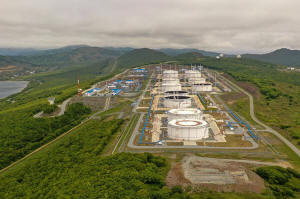|
Brent crude futures rose 57 cents, or 0.72%, to $79.78 a barrel
by 1043 GMT. U.S. West Texas Intermediate crude futures were up
47 cents, or 0.64%, at $74.33.
The Brent benchmark is approaching $80 a barrel again after
making gains in each of the previous three sessions.
"The recent strength is the result of the Israeli reply to the
counter offer from Hamas to the original peace plan, which
ensures that hostilities in the Red Sea will continue unabated,"
said PVM analyst Tamas Varga.
Israeli Prime Minister Benjamin Netanyahu rejected the latest
Hamas ceasefire offer and return of hostages held in the Gaza
Strip, but U.S. Secretary of State Antony Blinken said there was
still room for negotiation.
A Palestinian Hamas delegation led by senior official Khalil Al-Hayya
was due to travel to Cairo on Thursday for ceasefire talks with
Egypt and Qatar.
Wider Middle East tensions have kept the market on edge since
October, with limited progress in talks to end the Gaza
conflict.
A stronger than expected drawdown in U.S. gasoline and
middle-distillate stocks also buoyed the oil market.
Distillate stockpiles fell by 3.2 million barrels to 127.6
million barrels, Energy Information Administration data showed,
versus expectations for a 1 million barrel drop. Gasoline stocks
fell by 3.15 million barrels, compared with analyst forecasts of
a build of 140,000 barrels.
The draw in fuel stocks, combined with a rise in crude stocks,
was a sign of U.S. refinery maintenance, Varga said.
"Ongoing U.S. refinery maintenance, together with Europe being
short on diesel, can help maintain the positive sentiment for
now," he added.
(Reporting by Robert Harvey in London, Katya Golubkova in Tokyo
and Jeslyn Lerh in Singapore; Editing by David Goodman)
[© 2024 Thomson Reuters. All rights
reserved.]
This material may not be published,
broadcast, rewritten or redistributed.
Thompson Reuters is solely responsible for this content.

|
|




